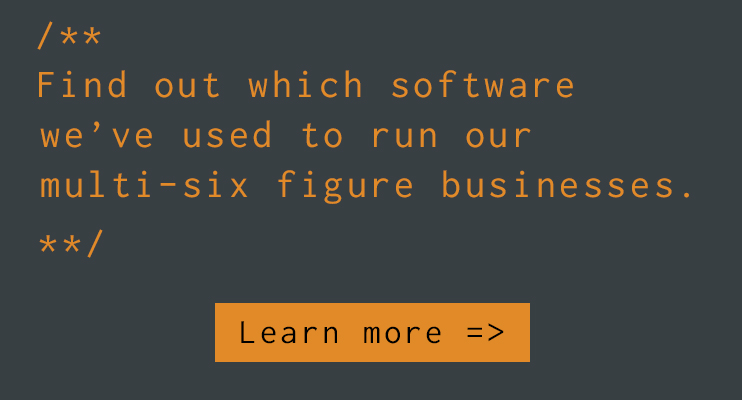For two and a half years, every two weeks I sifted through over 140 blog posts and podcasts that talk about how to build successful online businesses. I found the best content, summarized it, added a bit of my commentary, and delivered it to the inboxes of entrepreneurs around the world…for free. I’m no longer writing Signals in the Noise issues (because my business partners and I are focusing on other parts of Clarity Lab), but please enjoy these archived issues. There’s a ton of useful information in them!
1. LinkedIn + Consciousness + Compassion = WTF?
In all the hundreds of articles, blog posts, and podcasts I’ve gone through over the last few years, I have rarely come across something in the mainstream that addresses bringing a higher level of consciousness into the way we do business. Sad, but true. Things are changing though. Led by Fred Kofman, the author of Conscious Business, LinkedIn is in the process of publishing a large, free course on how to bring wisdom and compassion into the way we do business.
I’ve seen Fred teach live at an Integral Institute seminar, and he is not only brilliant but has such a warm heart. His presentation was the highlight of the event for me. He now works at LinkedIn, and this course they’re publishing for free was initially meant just for LinkedIn employees. They wanted first to become an example of a conscious business before teaching these things to a broader audience. It seems that the time has come, because they’re releasing the same course for free to the public. This is definitely worth checking out.
2. Rule breakers
“While making a living online, it’s easy to get lured into other people’s vision of doing business. You see something work for them, or something they’re sharing that netted them great results and you want to try it too. Why wouldn’t it work for me? we think. And sure, maybe it would.” The more important quest, says Paul Jarvis, is to find a path that works for you and your business.
There are many “tried and true” methods of building a sustainable online business out there, and dozens of people selling information on the best ways to do it. Should you try a video product launch, or a count-down timer on your sales page, or posting your phone number in an email so people can talk to you about signing up for your program, or any of the other hundreds of tactics out there? Maybe, but I agree with Paul: it’s more important to find ways of doing business online that fit with how you want to be, and how you want to be perceived.
It’s important to know what people are doing that’s working in the online business space, but it’s more valuable to take what they’re doing and adjusting it to fit you and your business. Break some rules. You might be surprised at the results.
3. The lean hammer.
Eric Ries’ Lean Startup methodology has been all the rage in startup land in the four years since he wrote his book The Lean Startup. Designed to help startups build digital products that people will actually want, the method has gotten so popular that people have started repackaging and repurposing it outside of the world of software products…including businesses with physical products or information products.
But is every business a nail for the Lean Startup hammer? The Next Web’s Natasha Hussein isn’t so sure. The Lean approach doesn’t seem to work too well when your product is physical, or when it involves a good deal of creative and artistic vision. And the heavy emphasis on launching a minimum viable product can often lead people to sacrifice quality in favor of getting something out in the wild that they can get feedback about. For better or worse, I’ve always been a fan of launching maximum viable products.
4. Plug it in.
Pretty much any type of functionality you could imagine wanting to have on your WordPress site (wait, your site is built on WordPress…right?) can be accomplished with any of the tens of thousands of available plugins in the WordPress plugin directory. This is one of the big reasons I always recommend that people build their online businesses site with WordPress. It’s solid, does what you need it to do, and there’s an enormous community of people developing and selling products for it. Whatever you want to do with your site, there’s probably a plugin for it.
But just because there are over 38,000 plugins you could install, does that mean you should install away to your heart’s content? Nope. Only install plugins that you really, really need to have on your site. Delete ones you’re not using. Keep them all updated (along with the core WordPress files) to prevent large security holes for hackers to exploit and then destroy your site. And make sure you ask these questions before you install any plugin.
+ 7 WordPress plugins that will get you more traffic to your site.
5. The unbalanced universe.
“You don’t go to the amusement park roller coaster and say ‘I want to be balanced.’ No, you want to be as unbalanced as possible, because that’s the thrill ride.” That’s astrophysicist and host of the brilliant Cosmos TV series, Neil deGrasse Tyson, on why striving for a state of work-life balance is overrated. He doesn’t have balance, but he’s happy about that. I don’t know that I’ve ever met anyone who does have perfect work-life balance. I don’t have it either. But…I find it inspiring to hear someone I admire say that a perfect balance between work and life isn’t really the best thing to have, because the tension between the imbalance is where some of our greatest ideas and contributions to humanity can come from.
I’m not advocating that we all start putting in 15-hour workdays six days a week. Living like that is crazy and unhealthy. I’ve done that for periods of my life while building and running some of my online businesses, and it’s not fun. These days, I try to shoot for having enough time to do a little of the things outside of my work hours that I love, like being with my wife and son, or training on my road bike. And as for work time, if I can keep it around 6 to 7 hours a day, 6 days a week, I’m happy. The biggest piece of advice I can give on this topic of finding a state of comfortable imbalance is to not try and build and run your online business alone.
6. Unhitching the side car.
“I mean, you can’t remove your blog sidebar, right? Every “ninja” and “guru” with a decent internet connection and a modest grasp of grammar and syntax has a sidebar on their blog. How else are you supposed to generate leads?” Impact Brand and Design’s John Bonini, on exactly what happened when they decided to remove the sidebar from their blog. The upshot is that they increased the conversion rate for their main call to action in blog posts by 74%. I’m off to remove my sidebar…
7. Caught working.
I normally do most of the writing for these newsletters on Sunday, but this Sunday I am knocked out flat on my back in bed with a cough, a headache, and a pretty bad fever. It’s the first time I’ve been under the weather in summer, and the first sickness I’ve had in about 3 or 4 years.
I waited until my wife was off for a hike before I pulled out my laptop and started writing, because I knew she’d not be happy with the fact that I was working while in this state. She just came back and caught me working in bed though. “Forest, are you working on your newsletter?”
“Um…yes, I am,” I replied. “You don’t need to be working now. Just write them a note and let them know you’re sick. When you’re sick, just be sick,” she said. “Must (cough) keep (cough) going (cough cough),” I replied.
But she’s right. I’m not doing so well at the moment, so I’m going to cut this newsletter a bit short. This is one of the downsides of having a small, online lifestyle business. If you’re doing your business alone, or even if you have a small team, there are times when life happens, times when you really shouldn’t be working, but you’re the only one who can do what needs to be done to keep things moving forward.
Having an online business gives you many freedoms you’d not otherwise have, but there are challenges that come with that freedom, like having to work when you’re sick, or during family crises, or not being able to unplug fully from your work while on vacation. Even so, I still think it’s worth it to do the work and build your own dream business.
That’s it for this issue, my friends. I’m off to get some rest.
If you got some helpful tid bits out of this issue, I’d love it if you’d share it with your friends:
Thank you so much for spending a little time with me today.
Keep going, one step at a time, and you’ll get there.
All the best,
Forest Linden
Editor-in-chief
Signals in the Noise
p.s. You can find the archives of past issues right here.


